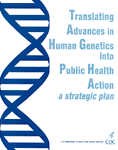Translating Advances in Human Genetics into Public Health Action: A Strategic Plan
This website is archived for historical purposes and is no longer being maintained or updated.
Foreword

The news media report advances in genetic research almost every day. Recent discoveries have associated specific gene variants with the development of disease or chronic conditions, many of which affect broad segments of the population. For example, BRCA1 is associated with a high risk for breast and ovarian cancer, CCR5 confers protection against HIV infection and the development of AIDS, and hereditary hemochromatosis leads to significant morbidity and mortality from iron overload. Simultaneous with these advances, genetic tests are increasingly being developed and made publicly available.
Putting this information to good use to promote the health and well-being of all members of society requires a keen understanding of complex issues. Chief among these issues are the ethical ramifications of using new genetic technologies, and variations in personal and cultural views on what constitutes disease and disability. Another issue concerns the accumulation of epidemiologic information on how results from genetic testing can be used to prevent disease manifestation. The interaction between genotype and environmental factors–such as behaviors and exposures–also calls for extensive study to determine how such factors can be modified to improve health outcomes. The value of certain genetic tests in disease prevention and health promotion efforts has yet to be determined, and standards for laboratory testing are only evolving. Policies are needed to ensure the appropriate use of predictive genetic testing and counseling and to prevent inappropriate use of such testing, particularly for diseases (such as Huntington’s disease and Alzheimer’s disease) for which effective environmental, behavioral, or medical interventions are lacking. People must be assured that information about their genetic composition will remain confidential and that they will receive appropriate counseling about treatment options for known conditions.
These issues illustrate the multifaceted public health dimensions of genetic research, which is already changing the practice of medicine and will have a profound effect on health care in the new millennium. CDC, in concert with other federal agencies and in collaboration with many public and private partners, can assist public health professionals in promoting health and preventing disease and disability among people for whom the consequences of an inherited risk can be ameliorated. The recommendations in this strategic plan will help ensure that results from genetic research are responsibly used in public health practice. Each of these recommendations has potential policy, coordination, partnership, and resource implications.
- Page last reviewed: October 2, 2017 (archived document)
- Content source:


 ShareCompartir
ShareCompartir